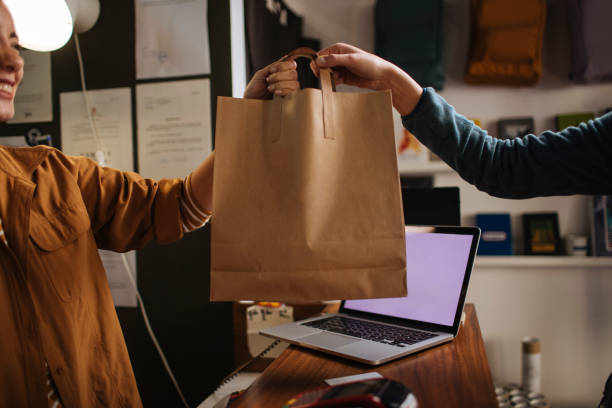
The Evolution of Grocery and Shopping Bags
At POSPaper, we know the critical role that grocery and shopping bags play in retail. These bags have become more than a shopping tool in recent years, changing consumer preferences, environmental concerns and more. Join us on a journey through the evolution of food products and shopping bags, exploring the intersection of sustainability and convenience.
The History of Shopping Bags
Years ago, paper bags were the standard choice for carrying food. Durable and biodegradable, these bags are synonymous with classic social business practices. However, concerns about deforestation and resource depletion have led to a shift towards sustainable alternatives.
The 1970s saw the rise of plastic bags, prized for their lightness, durability and affordability. Its popularity has skyrocketed as retailers embraced the convenience of plastic. However, this change has had an environmental impact, increasing concerns about plastic pollution and its impact on ecosystems.
The New Trend: Reusable Bags
As environmental awareness increases, consumers seek alternatives to disposable plastic bags. Reusable bags made from cotton, jute and non-woven polypropylene are the solution. These bags are durable and convenient and reduce the environmental impact of shopping.
Conscious of the need for environmentally friendly options, the market welcomes biodegradable and compostable bags. Bags made from materials such as corn break down faster than plastic, citing concerns about long-term environmental impact.
The shift in the production of shopping bags
This shift continues by introducing new materials such as recycled plastic, mushroom mycelium and other plants. Retailers are looking for solutions that balance functionality, durability and environmental sustainability.
Personalization and branding bags as marketing tools
The bag has become a powerful business tool as well as business. Retailers now personalize bags with logos, text and vibrant designs to turn every shopping trip into a brand promotion. The evolution of luggage coincides with a general shift towards experiential shopping.
Transitional care: Promoting sustainable practices
Governments and cities around the world are implementing policies to ban single-use plastics. Many countries have banned plastic bags or limited their prices, causing retailers to use different methods. These regulations are essential in directing the sector towards environmentally friendly practices.
Consumer Preferences: Driver Change
Consumers are environmentally conscious today and look for brands that match their values. This change in consumer behavior has also led to changes in the retail industry, forcing businesses to adopt good practices, including reusable bags.
Final Thoughts
At POSPaper we understand the changing landscape of grocery and shopping bags. Our commitment to sustainability allows us to offer many environmentally friendly options, including reusable bags, biodegradable materials and other innovations. We believe that businesses can be environmentally responsible while operating efficiently.
As we look to the future, retailers and consumers must be involved in developing food products and shopping bags. Choose reusable options, support businesses committed to sustainability, and be aware of eco-friendly products.
